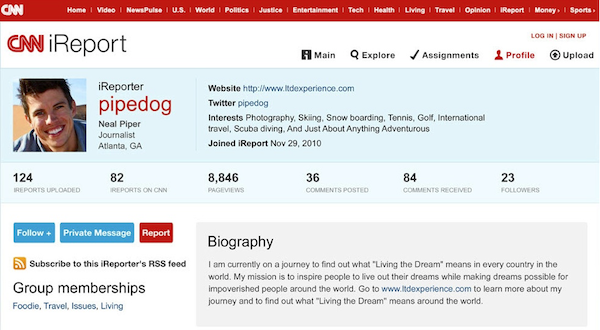
Today brings the launch of an overhaul of CNN’s iReport, the network’s platform for citizen journalism. As of today, iReport will look much less like a straight-up content site…and much more like a social network. One that, CNN.com participation director Lila King told me, “turns the site into something that’s focused on people far more than news stories.”
For a good summary of the overall changes in iReport, check out Mallary Jean Tenore’s overview over at Poynter, which is chock full of detail about how the revamped site will run. Though the idea of a social network for citizen journalism — particularly one that exists within the confines of a sprawling cable news website — is intriguing, I’m especially interested in what the revamped iReport will offer CNN in terms of knowledge about its own audience and participants. The new site will focus on user profiles, a big part of that being the areas of interest and expertise that users have identified. It will offer users, King says, a “very personalized experience that tailors the homepage and iReporters’ profiles toward the sources and the topics and the people that folks are interested in.”

And what that experience will mean, on the back end, is — ostensibly — tons of data about users’ (self-identified) areas of interest and expertise. According to internal numbers provided to me by CNN, iReport currently has 955,000 registered users. If even a fraction of those users go the social media route and register their interests with iReport, that could provide CNN with some immensely valuable information not only about the areas their users are interested in, but also the areas their users care about. For TV news, in particular, which has traditionally been even more detached from its audience than print journalism, that information could be incredibly useful. “In the past, we’ve collected in an ad hoc fashion groups of iReporters around particular areas of the spectrum,” King says. But they’ve never done so “in a publicly designated way.” Opening up the process — essentially, crowdsourcing user data from the users themselves — could allow for communities and itinerant publics to spring up using CNN’s site as their platform.
The core of the new iReport reminds me a lot of the Public Insight Network, American Public Media’s effort to “connect enterprising journalists with knowledgeable sources” — with the significant caveat that PIN focuses on citizens-as-sources, rather than citizens-as-producers. While iReport is focused on direct user participation, there’s also the intriguing possibility that the newly networked site could facilitate more direct collaboration between iReporters and CNN’s reporters — teamwork that makes use of user data and the power of the detailed call to action. “We’ve learned through experience,” King says, “that the best way to inspire contribution and participation is to give people a very specific call to action that’s tailored to them — and that says, essentially, ‘Here’s a story that needs your voice. Here’s how you could contribute.'”
That approach could be especially useful, King points out, for things like focus groups — particularly as the 2012 campaign ramps up — but also for “lots of other topics that we haven’t even dreamt up yet.” And: “I’m pretty sure that it will result in richer, more diverse coverage.”
So while the newly networked iReport can foster user participation with CNN, it can work the other way, as well, by allowing CNN to better connect with its constituents. It “just gives us more tools in our arsenal to include more perspectives in our coverage,” King says. More importantly, it “helps us, in some ways, get at groups of people who aren’t traditionally included in news coverage,” she points out. “Especially in the political arena, you tend to shy away from people who have very strident and public opinions on issues. But the beauty of iReport is that almost everyone who contributes contributes because they feel personally motivated to be part of the story — because it affects them in some way, because they’re living through it, or because it’s an issue that’s near and dear to their part.”
Ultimately, King says, “we’re creating a scenario where people can very explicitly say who they are and what they think and what they want to contribute to.” And as long as CNN’s staff does “the good work of journalists in being very clear and transparent about who people are and where they’re coming from when we include their perspective, I think it’s going to make our stories better.”